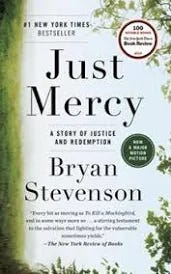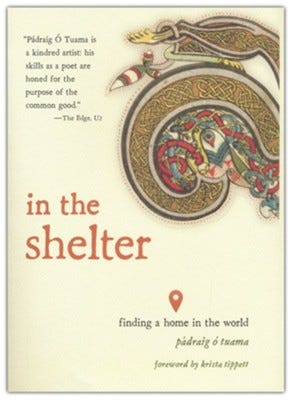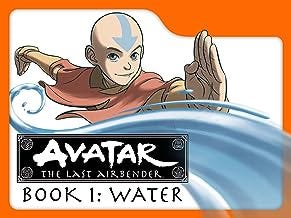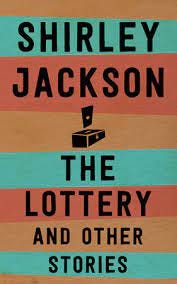Welcome to Pocketful of Prose, a community for sharing stories. As always, there is an audio recording of this post if that works better for your life and you enjoy listening to random background noise. This is part three in a series I am writing on the power of story. No worries, if you missed the first two parts, you can find everything on my Substack homepage, but you can also just jump in here. As I always, I will pose some questions at the end, so please join us for some conversation in the comments. If you like what you read, please click the small heart at the bottom of the post. Today, I have drawn attention to it with a large green arrow, a trick I learned from my Substack friend, Betsy Marro over at Spark. Math is not my superpower, but currently only 10 percent of readers click that heart. I think we can do better than that.
Without further ado, today’s pocket.
I am lucky enough to be sitting at a white linen table at 7:30 in the morning listening to Bryan Stevenson talk. If you don’t know who Bryan Stevenson is, he has spent his entire law career working for justice, particularly for the poor, the marginalized, the incarcerated and the condemned, trying to save people’s lives in a broken system, trying to help people, many of whom are children, in a world that would rather permanently criminalize them. He is the author of the memoir, Just Mercy.
I write memoir, and I teach memoir, but it is not until this moment that it occurs to me that Just Mercy is a memoir.
In his book In the Shelter, Pádraig Ó Tuama writes “we are the stories we tell about ourselves and we are more than the stories we tell about ourselves.” I would add, that the stories we tell about ourselves are about more than ourselves.
Memoirs are stories we write about ourselves, but our story is a window into the stories of others.
Whitworth University invited Bryan Stevenson to speak as part of their President’s Leadership Forum, and a few of the teachers I work with who are teaching his book this year, asked me if we might be able to swing it as professional development. There are many of us here today from across Spokane, from the school district, from church communities, from various social work fields, from other public interest sectors. We are all gathered here to learn from Bryan, and just being in this space, recognizing that there are many other people in my community who are also curious about how we might create a more loving, merciful world, soothes my heart. I have learned from Bryan before, when I listened to his Ted Talk and when I read his book. I was floored each time. I am going into this situation with high expectations, and from past experiences, this doesn’t always work out for me. Before Bryan even says a word, he is awarded an honorary doctorate from Whitworth University, and we give him a standing ovation. We are applauding him for his lifetime of service. He has earned an ovation even before speaking.
When Bryan starts talking to us, he tells us stories. He tells us about his grandmother, so we can have a sense of who he is, and where he comes from. Then, he outlines a path forward.
“We need to change the narrative,” he says. We need to recognize that some narratives cause destruction.
I administered a reading and math test a couple of weeks ago to high school students. The students were “invited” to take the test if they did not score a 3 or a 4 on one of our state standardized tests. My colleague and I prepared tirelessly for all aspects of testing to ensure that it ran smoothly, communicating to students and parents, getting passes to students to report to the library for testing, creating rosters to ensure we didn’t have too many kids testing at once. I have never made so many excel spreadsheets in one day before. When the students arrived, they asked why they were testing. Many of them hadn’t read their email. Some of them did read it, but they were still confused. While I had upwards of 10 color coded excel spreadsheets, I did not spend time in advance drafting an explanation to them for why they were here. I did my best on the fly to explain why they were testing, but I received a phone call from a parent later that day that her son walked away thinking that he was there to take the test because he had not done well in his math class last year. He had heard a message that made him feel inferior, and the person delivering that message was me.
I needed to change the narrative. I shared what I told the students with my daughter, who is also a high school student. She told me which words I should take out of my script. “Stop using the word proficient,” she said. “Just tell them, they are there because they have to get a certain score on this test and tell them that you and the school will do everything you can to help them meet that goal.” My new narrative focused on the test requirements and reminded students that this test was not an indicator of how they were performing in their classes. Next time, I might also remind them that I know a lot of amazing teachers who have failed their National Boards, an assessment designed to measure teaching, and that tests are sometimes just hoops that we have to learn how to jump through, that they are not an indicator of our inherent worth.
Sometimes we need a new story.
My family and I love a show called Avatar the Last Airbender. When Anna was about five, we watched it with her, and then when Seabass was about the same age, we all watched it again, and we repeated this process with Mateo when he came to live with us. It is a special show about children trying to save the world by restoring harmony and balance. In one episode of the show called “The Great Divide,” two Earth Kingdom tribes are trying to cross the world’s largest canyon. The task before them is extremely difficult, but it is not impossible. However, these two tribes were born into a story of hatred, of one side despising the other. They have been feuding for so long, that instead of making any progress, they devolve into bickering and blaming. Maybe the story sounds familiar to you. Aang, the Avatar and one of the heroes in the narrative, gets everyone out of the canyon by making up a new story.
Telling a new story is not easy. Changing the narrative is conscious, challenging work. Seventy-five years ago, Shirley Jackson published a story you might recognize in The New Yorker. At the time, “The Lottery” caused public outrage because of the violence it contained …an entire village ready to stone one of their members simply because this is the way things have always been done. “No one liked to upset … tradition.” It’s a horror story, but what really makes our skin crawl is not the gruesome plot, it’s that the fictionalized plot is closer to the truth than we are comfortable with.
This week in the wake of terrible world news, my Substack friend Garrett who writes The White Pages wrote something that landed in my heart. He wrote, “The day after the war started, I was reminded that to actually love all of humanity is to believe that every system of domination has the same roots. There is no poetic way to say it, but that doesn’t make it any less true. We live in a world built by White Supremacy, capitalism, and patriarchy. I can doubt whether I have anything useful to say about Israel and Palestine because I’ve never experienced anti-Semitism or anti-Arab racism, but I do walk in a world forged by those and so many other interlocking systems of domination. I know how those systems purport to offer some of us freedom, but actually leave all of us in chains. I know that if there were any joy to be found in privilege, that it wouldn’t need to be protected by cops, guns and walls…We all suffer from the myth that human life is defined by hierarchy and scarcity.”
It's this same myth that values some knowledge over others. It’s this myth that values some lives over others. It’s this myth that keeps our prison population on the rise. It’s this myth that destroys our planet. It’s this myth that makes us think we can fight violence with violence.
It is time to change the narrative.
In addition to changing the narrative, Bryan tells us we must not lose hope. He shares a story about his grandmother buying him an encyclopedia for Christmas. His friends got bikes. He got letter D. At the time, he would have preferred a bike, but over time, he realized what his grandmother was truly giving him. It is a gift my grandparents, who were also encyclopedia lovers, gave me. If I close my eyes, I can see my grandfather at the dining room table, pulling out the encyclopedia, to offer some clarity to a question that has been raised. His hunger for knowledge never died. I don’t own a set of encyclopedias, but I meet my grandfather today in my garden when I pull out my binoculars to learn more about the family of birds visiting my spent sunflowers. I compare what I see to what’s in my bird book. They are mountain chickadees.

Teaching and learning are acts of hope.
And so too, is storytelling. Janisse Ray, another Substack friend who writes The Rhizosphere, wrote this week about why we must continue to tell stories when faced with threat. “Only by telling stories-connecting people, offering epiphanies, imagining new narratives that are just, replacing destructive narratives—can we create a world that helps us lead more meaning, sensible, functional, and fulfilling lives.”
In other words, write yourself a more beautiful life. Write yourself a more beautiful world.
When Bryan is done sharing with us, all I can think is that a standing ovation is not enough. Can I stand on my chair? Can I push aside the breakfast remnants and climb on top of this white linen table? What can I do to convey how much I have been moved?
It only occurs to me while writing this piece that the best way to show my appreciation for Bryan’s words is to try and live them.
Change the narrative. Change the world.
What resonates with you today? Where are you finding hope? What’s a story that you are choosing to tell differently? Bryan Stevenson’s Just Mercy was a book that changed me. Tell us about a book that changed you.
And in case your eyesight is as bad as mine, here’s the heart to click if this post meant something to you.









"Our words become the house we live in." Hafiz
We are responsible for the house we build.
TY for sharing this piece!!
Thank you, Mary, for interweaving different voices/narratives in speaking to the current moment in our world. It is helpful to me to be in the company of stories and people committed to wrestling with painful complexities while also seeking beauty. The quotations below (which were shared by Erik Rittenberry on the Poetic Outlaws Substack have been orienting to me the last few days (particularly this notion that "our heart glows" and that "we do not need to know precisely what is happening" ):
"Deep down, below the surface of the average man’s conscience, he hears a voice whispering, ‘There is something not right,’ no matter how much his rightness is supported by public opinion or by the moral code. Our heart glows, and secret unrest gnaws at the root of our being.” — Carl Jung, 1931
"You do not need to know precisely what is happening, or exactly where it is all going. What you need is to recognize the possibilities and challenges offered by the present moment, and to embrace them with courage, faith, and hope.” -Thomas Merton